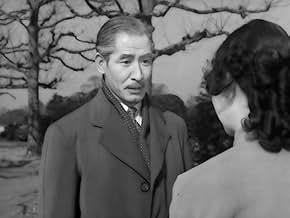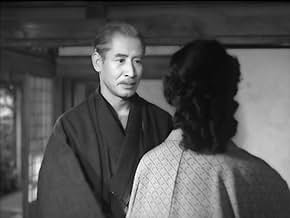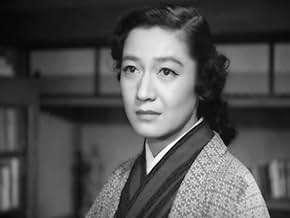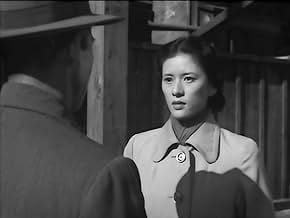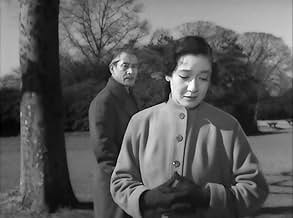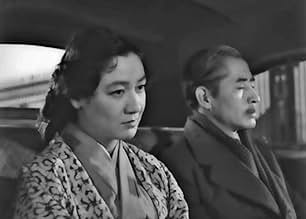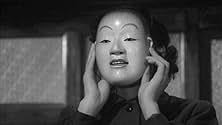NOTE IMDb
7,7/10
2,3 k
MA NOTE
Ajouter une intrigue dans votre langueAn ingratiating bride develops warm ties to her father-in-law while her cold husband blithely slights her for another woman.An ingratiating bride develops warm ties to her father-in-law while her cold husband blithely slights her for another woman.An ingratiating bride develops warm ties to her father-in-law while her cold husband blithely slights her for another woman.
- Réalisation
- Scénario
- Casting principal
- Récompenses
- 1 victoire et 1 nomination au total
Avis à la une
10kerpan
"Yama no oto" is, in essence, the story of the love between a daughter-in-law (Setsuko Hara) and the father (So Yamamura) of her neglectful and selfish husband (Ken Uehara). As Yamamura becomes more and more aware of the unhappiness of Hara, he takes ever more unconventional steps to try to rescue his son's marriage (for instance, approaching his son's mistress). Though the issues of infidelity, abortion and divorce swirl through this film, the tone is remarkably low-key and unmelodramatic. The cinematography here is similar to that found in Ozu's films of this period, though not so rigorous. The performances of Hara and Yamamura are superb. A very well-done and moving film by Japan's greatest neglected master.
This film tackles a subject that even today is controversial: Choice. Kikuko (the utterly amazing Setsuko Hara) is locked into a loveless marriage with her husband. They live with his parents, and it is particularly her father in law Shingo (Su Yamamura, who also is excellent) that she is closest to. Kikuko is a veritable maid, but mostly doesn't complain, while her husband is having an affair. You want Kikuko to confront him, but she doesn't. Then (this is where it gets controversial) Kikuko finds out she is pregnant, doesn't tell anyone and gets an abortion! Her reason is that its not the time to have a child, since her relationship is in flux. In the movie "Juno", Ellen Page brings the baby to term. The brilliance of this film is its unflinching subject and how its handled, with dignity, sadness and relief. If this film were released today, especially in the United States, you'd have so many interest groups up in arms about it. That its handled like this, with you deciding what to feel rather than having your feelings be dictated to you, makes this a masterpiece. In every review I've written in which she has been an actress I've praised Setsuko Hara. She is beautiful (especially when she smiles), but its really about the seemingly effortless way she portrays all types of women, strong, weak, resilient, unable to cope etc. She is one of the greatest actresses to have ever graced the screen and her portrayal is phenomenal as the under appreciated wife who makes a choice based on her circumstances. Director Mikio Naruse has always considered this one of his best films, and it is. Even if you're passionate about the "life" issue, see this film. I can't say enough about the acting of Ms. Hara in this film. The film is essential viewing.
The team of Hara, Kawabata, Naruse, and Uehara is back with another inconsistent, too long film about marital (and other) woes. When it's focusing on the love affair between the elderly father, wonderfully played by So Imamura, and his young, child like daughter in law, affectingly portrayed, as usual, by Setsuko H, the film can stand comparison with the master of heartbreaking, Japanese family drama, Ozu. However, when it wanders off into side stories, like the one about the son's mistress and the mistress' room mate, things can, frankly, get a bit dull. Give it a B minus. PS...It's a long time coming but that last scene in a Tokyo park is a real ticker tugger.
I'm well aware that Mikio Naruse is one of those holy cows of film history. Criticising him is some kind of blasphemy.
And yet I'll gladly die painfully on this hill: Every single one of his movies is terrible out of principle.
I've you've seen one Naruse, you've seen them all because there is literally nothing to it. Every single story - this one included - is basically about a ridiculously noble, self-pitying, suffering woman in a world where virtually every man is a smug, condescending parody of a man.
Women always have the moral highground and the whole thing is nothing but a mawkish didactic-play with the depth of a sunday morning cartoon.
It's redundand to say anything about his laughable radical feminism and I want my review to finally get through.
Again, his movies are objectively bad, people just don't (want to) see it because we live in objectively bad times.
And yet I'll gladly die painfully on this hill: Every single one of his movies is terrible out of principle.
I've you've seen one Naruse, you've seen them all because there is literally nothing to it. Every single story - this one included - is basically about a ridiculously noble, self-pitying, suffering woman in a world where virtually every man is a smug, condescending parody of a man.
Women always have the moral highground and the whole thing is nothing but a mawkish didactic-play with the depth of a sunday morning cartoon.
It's redundand to say anything about his laughable radical feminism and I want my review to finally get through.
Again, his movies are objectively bad, people just don't (want to) see it because we live in objectively bad times.
The businessman Ogata Shingo (Sô Yamamura) works with his son Shuichi (Ken Uehara), who is his secretary, and they live together in the suburb with their wives Yasuko (Teruko Nagaoka) and Kikuko (Setsuko Hara) respectively. Shuichi has a love affair and has a loveless marriage with Kikuko. Yasuko has dedicated her entire life to her family but Shingo married her only because her older sister had died. Kikuko is the pride and joy of Shingo and they are close to each other.
Out of the blue, Shingo and Yasuko's daughter Fusako (Chieko Nakakita) leaves her husband and arrives at Shingo's home with her two children. Shingo investigates and finds the address of Shuichi's lover. Meanwhile Kikuko goes to the hospital and Shingo learns that she was pregnant but decided to abort her child.
"Yama no oto" is a movie about forbidden love based on the novel of Yasumari Kawabata and directed by Mikio Naruse that uses the favorite theme of Ozu – the family drama - and similar locations. The story is based on the patriarch Shingo, a man that has married his wife without loving her but also respected her along their lives. He feels a forbidden love with his sister-in-law Kikuko, a woman that is apparently submissive working as a servant at home, but strong enough to abort her child to avoid keeping her loveless marriage with her husband. Fusako is Shingo's estranged daughter that is also strong enough to leave her husband and move with her children to her parents' home. This women behavior is unusual in Japanese movies from these years. My vote is eight.
Title (Brazil): "O Som da Montanha" ("The Sound of the Mountain")
Out of the blue, Shingo and Yasuko's daughter Fusako (Chieko Nakakita) leaves her husband and arrives at Shingo's home with her two children. Shingo investigates and finds the address of Shuichi's lover. Meanwhile Kikuko goes to the hospital and Shingo learns that she was pregnant but decided to abort her child.
"Yama no oto" is a movie about forbidden love based on the novel of Yasumari Kawabata and directed by Mikio Naruse that uses the favorite theme of Ozu – the family drama - and similar locations. The story is based on the patriarch Shingo, a man that has married his wife without loving her but also respected her along their lives. He feels a forbidden love with his sister-in-law Kikuko, a woman that is apparently submissive working as a servant at home, but strong enough to abort her child to avoid keeping her loveless marriage with her husband. Fusako is Shingo's estranged daughter that is also strong enough to leave her husband and move with her children to her parents' home. This women behavior is unusual in Japanese movies from these years. My vote is eight.
Title (Brazil): "O Som da Montanha" ("The Sound of the Mountain")
Le saviez-vous
- AnecdotesSô Yamamura, who portrays Shingo the father, was actually one year younger than Ken Uehara, who portrayed his son Shuichi.
- Citations
Fusako Aihara: What do you think, Father? You're busy reading the newspaper. Nobody really cares about my troubles.
Shingo Ogata: I don't know what to say. From the outside, you can never tell what's really going on in a marriage.
Meilleurs choix
Connectez-vous pour évaluer et suivre la liste de favoris afin de recevoir des recommandations personnalisées
Détails
- Date de sortie
- Pays d’origine
- Langue
- Aussi connu sous le nom de
- Sound of the Mountain
- Société de production
- Voir plus de crédits d'entreprise sur IMDbPro
- Durée1 heure 35 minutes
- Couleur
- Mixage
- Rapport de forme
- 1.37 : 1
Contribuer à cette page
Suggérer une modification ou ajouter du contenu manquant

Lacune principale
By what name was Le grondement de la montagne (1954) officially released in India in English?
Répondre
